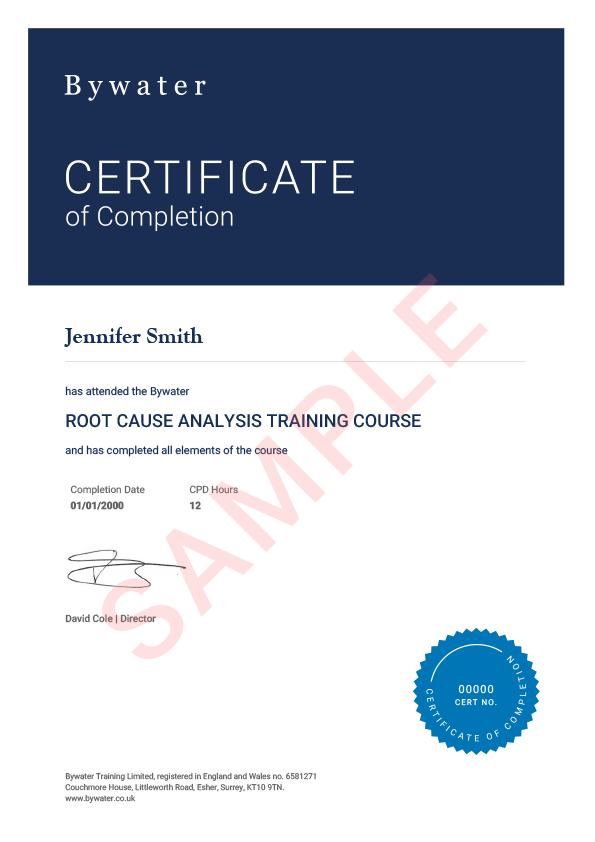Root Cause Analysis Training for All Industry Sectors
DURATION
2 daysCPD
Equivalent to 12 hoursCERTIFICATES
All delegates will receive a certificate on completion.DELIVERY OPTIONS
Learn how to identify the source of faults, failures and undesired outcomes in processes and design, and how to solve these problems, on this Root Cause Analysis for All Industry Sectors training course.
The course will prepare delegates for typical workplace RCA practices, including problem identification, RCA tool selection and report writing.
- managers responsible for process and quality improvements
- quality managers
- internal and external auditors
- line managers and supervisors involved in managing customer and/or supplier relationships
- problem-solving team members and leaders
- product or process designers
- industrial, production and process engineers
Those working in the NHS and private healthcare sectors may prefer to attend our specialised Root Cause Analysis Training for NHS and Healthcare Professionals course.
We also run an Incident Investigation & Root Cause Analysis training course designed to focus on conducting thorough workplace incident reviews.
Please note that it is advisory for delegates to bring a laptop for use during this course if possible.
- identifying problems
- the role and principles of root cause analysis
- overview of the industry standard 8D/G8D process
- raising a problem
- problem-solving teams
- types of problems: common and special causes
- isolated events and repeating problems
- problem-solving strategy
- common problem-solving tools
- process compliance
- statistical techniques in problem solving
- localisation in time, space and sequence
- 5 Whys
- process mapping and contrasting symptom routes
- Shainin’s multi-vari analysis
- isoplots and measurement systems analysis
- using RCA to be proactive rather than reactive
- corrective and preventive action
- mistake proofing
- proving causes
- solution analysis
- project managing solution
- Day 1
- WELCOME AND INTRODUCTIONS
- Module 1 Why do we investigate?
- Module 2 Investigator Mindset
- Module 3 Planning & Team Selection
- Module 4 Event mapping
- Workshop 1 Case Study Review
- Workshop 2 Build Investigation Timeline
- LUNCH
- Module 5 Information Gathering
- Module 6 Human Factors in RCA
- Module 7 Interviewing Personnel
- Workshop 3 Identify Failure Mode
- Workshop 4 Interview Planning
- Day 1 review
- CLOSE
- Day 2
- REGISTRATION AND INTRODUCTION
- Module 8 Transition to Analysis
- Module 9 Identifying Causation
- Workshop 5 Timeline Review
- Workshop 6 Control Measure & Change Evaluation
- Workshop 7 Identify Causation Factors
- LUNCH
- Module 10 Root Cause Analysis
- Module 11 Actions & reporting
- Module 12 Root Cause Data & Learning
- Workshop 8 Root Cause Selection
- Workshop 9 Preventive Actions
- Review and course evaluation
- CLOSE
- participate in effective problem-solving teams
- use appropriate tools and techniques to identify and document the root causes of problems in production processes and administration systems, as well as product design
- propose and evaluate solutions to prevent problems recurring
- communicate their findings and recommendations to their colleagues and senior management
- engage senior management in improving the system to remove the causes of failure, and controlling random initiatives that may destabilise processes which are currently ‘under control’
Delegates will receive a Certificate of Completion in recognition of their new Root Cause Analysis knowledge and skills and commitment to professional development.

Upcoming course dates








This Root Cause Analysis course is suitable for anyone who wants to know more about problem-solving as part of their role. From design and engineering through to customer relationship management, if you are managing or participate in teams that are looking at improving processes, then this course offers you a new and valuable skill.
Organisations often find that their efforts to identify and correct the root cause of failures and inefficiencies falter because they do not completely understand how and why to find and fix those problems. On our 2-day training course you will learn about a wide range of best-practice approaches and proven tools to help you review and correct processes across the business, including choosing the right tool for the task. Importantly, you will have the opportunity to practise these tools under the guidance of experienced tutors while you are in the classroom.
Yes, you will receive a certificate after you have completed this 2-day course to state your attendance and confirm that you have achieved a new skill set.
The course is equivalent to 12 hours CPD.
We always ask for feedback from delegates at the end of the course so that we can build on suggestions for improvement.
At the same time, we are delighted to receive positive feedback. Our past attendees regularly remark on the communication skills of our expert tutors, the breadth and depth of the content, and the value of taking part in discussions and exercises.
Feedback on the skill of the tutors and the quality of the content has included many positive comments:
- ‘The tutor was great, pace was good and she used a case study which made it real!’
- ‘The tutor didn’t just read the slides, she took time to explain different scenarios to make it more applicable to us’
- ‘Very well explained by the tutor which means I understand the subject better than I expected to and have more confidence in my ability to apply the knowledge’
- ‘Comprehensive training materials. The tutor was excellent – he was interested in the company’s problems and needs with respect to root cause analysis’
- ‘Very impressed with having to solve a problem with tangible measures of success at the end’
- ‘Previously completed root cause analysis training with a different provider which really only focused on one methodology. This was better as it explained a number of RCA methods and tools’
From a wider perspective, attendees have provided great feedback on the course content and its value to their own work:
- ‘My newfound knowledge of the component parts to RCA is great. Firstly, finding the problem and the techniques used for that, then RCA itself and how to confirm whether solutions work or not. All very useful’
‘I have some experience in this subject matter but the tutor had a great wealth of knowledge that crossed over many techniques. He also had a realistic approach when discussing applying these techniques in our workplaces’
If you are interested in the wider aspects of risk management in an organisation, you may like to take a look at our training courses relating to ISO 31000, starting with our 1-day Risk Management Fundamentals training course.
We also offer training courses covering a number of Core Tools that can help you to address the challenges of managing risk through problem-solving:
- Failure mode and effects analysis (FMEA)
- Advanced Product Quality Planning (APQP) and Production Part Approval Process (PPAP)
- Statistical Process Control (SPC)
- Measurement Systems Analysis (MSA)
Customer reviews
Bilstein Group UK|9th Apr, 2025
Network Rail|24th Mar, 2025
Scottish Power|21st Mar, 2025
Scottish Power|3rd Mar, 2025
Scottish Power|17th Feb, 2025
Private|24th Jan, 2025
Nobia|10th Jan, 2025
Ardent|23rd Dec, 2024
GrandVision Tech Centre|2nd Dec, 2024
GrandVision Tech Centre|29th Nov, 2024
Virgin Atlantic Airways Ltd|22nd Nov, 2024
Virgin Atlantic Airways Ltd|21st Nov, 2024


